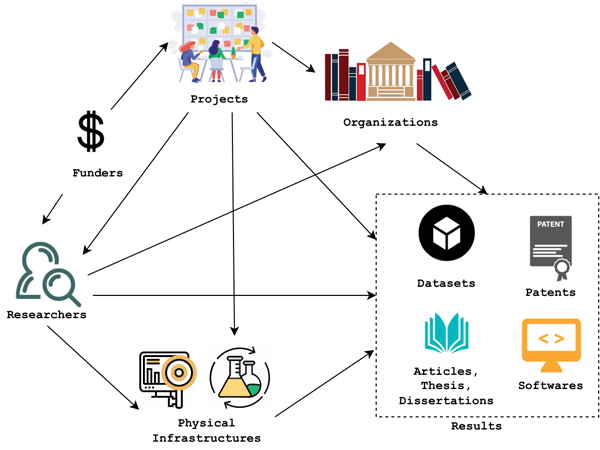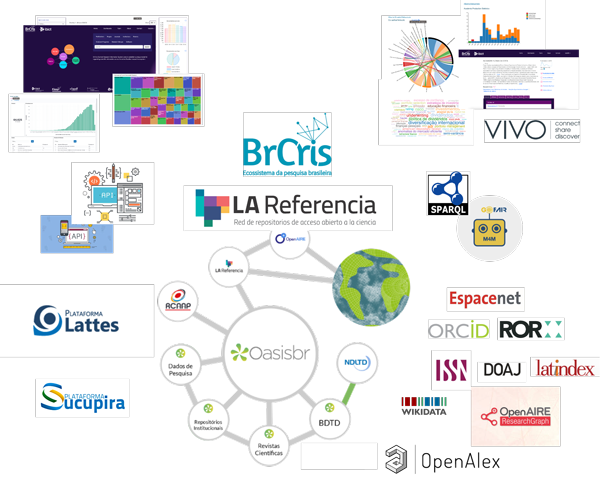About
Terms of use
Privacy policy
Data sources
Publications
2023
Mendes, W., Grando, R. L., Dias, T. M. R., Jorge, V. A., Carvalho Segundo, W. L. R. (2023). Estudo de caso da integração do Observatório Ciência, Tecnologia & Inovação em Saúde da Fiocruz ao Sistema BrCris/Ibict. Revista Científica da UEM: Série Letras e Ciências Sociais, 4(1), 29-34.
2022
Dias, T. M. R., Mena-Chlaco, J., Carvalho Segundo, W. L. R., Pinto, A. L. Moreira, T. H. J. (2022).BrCris: plataforma para integração, análises e visualização de dados técnicos-científicos. Informação & Informação, 27(3), 622-638.
Pinto, A. L., Carvalho Segundo, W. L. R., Dias, T. M. R., Silva, V. S. S. Gomes, J. C., Quoniam, L. (2022).Brazil Developing Current Research Information Systems (BrCRIS) as data sources for studies of research.Iberoamerican Journal of Science Measurement and Communication, 2(1).
Silva, V. S., Matas, L. Moreira, T., Carvalho Segundo, W. L. R.(2022).An ETL strategy for integrating the LA Referencia platform and VIVO for the Brazilian CRIS. Procedia Computer Science, 211, 111-117.
Carvalho Segundo, W. L. R., Dias, T. M., Moreira, T., Pinto, A. L., Silva, V., Gomes, J., Quoniam, L., Matas, L., Dias, A., & Schneider, J. (2022).A strategy for collection, integration, and processing of scientific data in BrCris context. Advanced Notes in Information Science, 2, 215-222.
Dias, T. M. R., Mena-Chalco, J. P., Carvalho Segundo, W. L. R., Pinto, A. L., Quoniam, L., Moreira, T. H. J., Silva, V. D. S. (2022).O Projeto BrCris: uma plataforma computacional para integração, visualização e prospecção de dados científicos. Encontro Brasileiro de Bibliometria e Cientometria, 8, 390-397.
Dias, T. M. R., Carvalho Segundo, W. L. R., Moreira, T. H. J., Silva, V. S., Pinto, A. L. (2022).Plataforma para agregação e análises de dados técnicos-científicos. Workshop de informação, dados e tecnologia, UFES, Vitória.
2021
Carvalho Segundo, W. Dias, T. M. R., Moreira, T., Pinto, A. L., Silva, V. S., Gomes, J. Quoniam, L. Matas, L. Dias, A. G., Schneider, J. (2021).O BrCris como ferramenta de apoio à Ciência Aberta.Cadernos de Biblioteconomia, Arquivística e Documentação, 1-37.
Dias, T. M. R. Carvalho Segundo, W. L. R. (2021).Validação automática dos currículos da plataforma Lattes à Biblioteca Digital Brasileira de Teses e Dissertações (BDTD). Páginas a&b: arquivos e bibliotecas, 3, 164-168.
Pinto, A. L., Carvalho Segundo, W. L. R., Quoniam L., Dias, T. M. R. (2021).The brazilian current research information system: BrCris. Colecção CA–Ciência Aberta, 319-330.
Silva, V. S., Moreira, T., Dias, T. M, Dias, J. G. Carvalho Segundo, W. L. R. (2021).Um modelo semântico baseado em ontologia para o cris brasileiro. Colecção CA–Ciência Aberta, 361.
Dias, T. M. R., Pinto, A. L., Mena-Chalco, J. P., Carvalho Segundo, W. L. R., Gomes, J. C., Silva, R. R., Quoniam, L. (2021).A informação patentária no contexto do BrCRIS. In: L. M. A. R., Alvares; A. L. C., Itaborahy. (Org.), Os múltiplos cenários da informação tecnológica no Brasil do século XXI. Rio de Janeiro: Ibict.
Carvalho Segundo, W. L. R., Rodrigues, T. M. (2021).On building a tool for finding datasets based on a list of researchers or publications. The 16th International Conference on Open Repositories, Denver, Colorado.
Pinto, A. L. Dias, T. M. R., Silva, V. S., Gomes, J. C., Carvalho Segundo, W. L. R. (2021).BrCris como um sistema de recomendação científico-tecnológica. In: XXI Encontro Nacional de Pesquisa e Pós-Graduação em Ciência da Informação, Rio de Janeiro, Brasil.
Pinto, A. L., Dias, T., Gouveia, F. C., Carvalho Segundo, W. R. (2021).Métricas de avaliação sobre revistas científicas para uso no BrCris/IBICT: um ensaio com dados da WoS e Google Scholar. In: LATmetricas, Medelin.
Pinto, A. L., Dias, T. M. R., Moreira, T. H. J., Carvalho Segundo, W. R. (2021).Identificación de especialistas basado en orientaciones y participación en tribunales de tesis. In: LATmetricas, Medelin.
Carvalho Segundo, W. R., Dias, T., Moreira, T., Pinto, A., Silva, V., Gomes, J., Quoniam, L., Matas, L. Dias, A., Schneider, J. (2021).Uma Plataforma para o Tratamento e Integração de Dados Científicos. In: XVIII Congresso Latino-Americano de Software Livre e Tecnologias Abertas, Foz do Iguaçu, Paraná.
Pinto, A. L., Magela, T., Dias, R., Silva, V. S. (2021).BrCris como um sistema de recomendação científico-tecnológica. In: XXI Encontro Nacional de Pesquisa e Pós-Graduação em Ciência da Informação, Rio de Janeiro, Brasil.
2019
Dias, T. M. R., Carvalho Segundo, W., Matas, L. (2019).Utilizando o framework LattesDataXplorer para vincular automaticamente os currículos da Plataforma Lattes à Biblioteca Digital Brasileira de Teses e Dissertações (BDTD). Ciência da Informação, 48(3).
MATAS, L. J., Dias, T. M. R., Carvalho Segundo, W. L. R. (2019).Improving LA Referencia metadata by linking research profiles to repositories: the case of the Brazilian Digital Library of Thesis and Dissertations (BDTD) and the Lattes CV Platform. In: Open Repositories, Hamburg, Germany.
System architecture
The architecture of BrCris is based on the description and mapping of connections between the different agents of the Brazilian scientific research ecosystem, among which are: researchers, funders, projects, organizations, laboratory and equipment infrastructures and research results (scientific publications, patents, etc.).

It is based on the infrastructure of Brazilian scientific repositories and journals, these aggregated by the Oasisbr Portal

Under the Elasticsearch indexes a search interface is generated, and a set of indicator dashboards. In the interface of the VIVO instance it is possible to perform visualizations under individual records of different agents of the Ecosystem.
History
In order to know how science evolves, who are its actors, what has been investigated, how knowledge is disseminated and communicated, and what future trends are, it is necessary to have a mechanism for consulting academic/technical/scientific information. The real understanding of science depends on the comprehensiveness, completeness and organization of where information is collected. It is in this context that BrCris is inserted.
We can understand BrCris as a national information management ecosystem that facilitates the collection, organization, storage and dissemination of information related to scientific research in the context of Brazil (publications, collaborations, patents, research projects and training of masters and doctors). Nowadays, BrCris, alongside other systems such as PTCRIS, has become a world reference on a system with computational support that covers all the science of a country, enabling a comprehensive and up-to-date view of research activities in an institution or even a specific thematic area.
BrCris has been tested with different pilots/case studies and presents a simple and intuitive interface for consulting academic information. The objective is to make bibliometric information available together with quantitative (and in the future qualitative) indicators, as well as visualization in different dashboards. The aim is to make the information available according to standards disciplined by Open Science.
Led by the Brazilian Institute of Information in Science and Technology (Ibict), the BrCris Project was officially born in 2014 as an integrated national research information ecosystem to support the ST&I activities developed in Brazil, in accordance with international best practices and standards.
BrCris, as an ecosystem, was designed and is being built with the participation of different people. Since its creation, a total of more than 55 people have worked directly with BrCris (PhD professors, software developers, information technologists, undergraduates, master's students and doctors from the most diverse areas of knowledge. The academic institutions of these professionals include, in alphabetical order: CEFET-MG, Ibict, Fiocruz, UFABC, UFC, UFRGS, UFRJ, UFSC, UFSCar, UnB and PUC-RJ. The project also had support and funding from the following funding agencies: CNPq, FAPDF and FINEP.
The development of BrCris allowed the improvement and transfer of technical-scientific knowledge, especially of collaborators still in training as are undergraduates, masters and doctoral students. This complement to academic training is intangible, but extremely important to help the student's career, since BrCris is developed and monitored with frequent meetings where, in addition to technical issues, activities and discussion on scientific research are highlighted.
Finally, it is important to highlight that BrCris was considered as an object of study in more than 47 research documents (scientific articles).